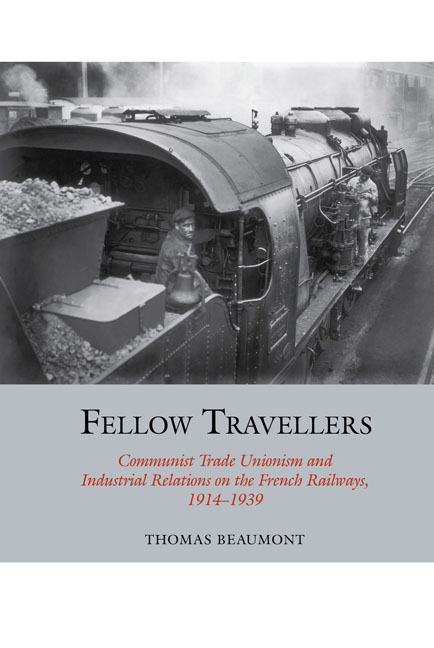 Fellow Travellers
Fellow Travellers Book contents
- Frontmatter
- Contents
- Acknowledgements
- Introduction
- 1 Railway Workers at War
- 2 Railway Workers and the ‘Après Guerre’
- 3 Railway Workers and the Communist Choice
- 4 Stabilisation
- 5 International Connections
- 6 ‘Hostile Participants’: Communists and Railway Industrial
- 7 Railway Workers and the Popular Front: From Victory to Defeat, 1934–1939
- Conclusion
- Bibliography
- Index
Introduction
- Frontmatter
- Contents
- Acknowledgements
- Introduction
- 1 Railway Workers at War
- 2 Railway Workers and the ‘Après Guerre’
- 3 Railway Workers and the Communist Choice
- 4 Stabilisation
- 5 International Connections
- 6 ‘Hostile Participants’: Communists and Railway Industrial
- 7 Railway Workers and the Popular Front: From Victory to Defeat, 1934–1939
- Conclusion
- Bibliography
- Index
Summary
Railway workers (in French ‘cheminots’) were the earliest, and among the most enduring, bastions of communist support in twentieth-century France. From the earliest days of its existence, railway workers provided the French Communist Party (PCF) with some of its most high-profile national leaders, together with a legion of highly active party militants spread widely through urban and rural France. Dispersed cheminot cells maintained a communist presence in some of the deepest regions of rural France, while massive concentrations of railwaymen and women in urban centres such as Villeneuve-Saint-Georges and Saint-Pierre-des-Corps (Tours) nurtured a rich and powerful working-class communist culture. Most significantly, railway workers voted en masse for communist ‘shop stewards’ in the workplace and joined the communist-led trade union Federation in large numbers, consistently making it the largest of the trade union organisations on the railways between the two world wars. The relationship between railway workers and the Communist Party was at the heart of the growth of a distinctly ‘French’ communist political culture, yet it is a history which in large part has yet to be told. Fellow Travellers contributes to remedying this lacuna in the history of the communist movement in France.
The relationship forged between communist militants and railway workers in the period between the two world wars would have long-lasting consequences for industrial relations and left-wing politics in France. The choices made by communist militants among the cheminots in these years were profoundly influenced by two key factors. First, a working environment that was shaped by the professional ethos of railway labour and, second, by the long-lasting legacies of the devastating 1920 strike defeat, which effectively curtailed the railway workers’ willingness to openly confront management and the state for much of the rest of the period covered by this book. In such circumstances, communist activists looked to the everyday politics of the workplace as the key focus of their activities. In so doing, communist activists on the railways set down deep and lasting roots of support. They maintained this support even through the sectarian period of the Comintern's shift to ‘class-againstclass’, deepening their participation within railway industrial relations and engaging with managers and state officials. They would build upon this crucial experience during the years of the Popular Front (1934–1938).
Information
- Type
- Chapter
- Information
- Fellow TravellersCommunist Trade Unionism and Industrial Relations on the French Railways, 1914–1939, pp. 1 - 14Publisher: Liverpool University PressPrint publication year: 2019